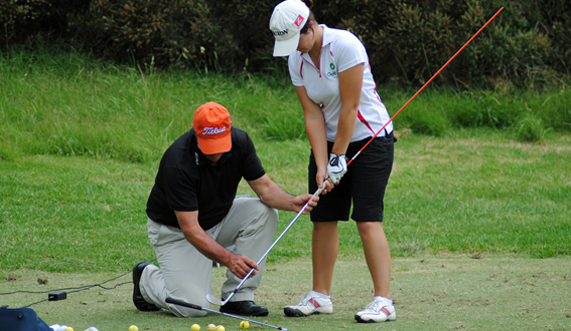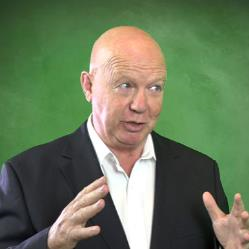 (Photo by Rob Carr/Getty Images)[/caption]
(Photo by Rob Carr/Getty Images)[/caption]
"Consistent practice drives sustainable outcomes" - an interview by John Smibert.
I believe the key to driving sustainable growth in sales productivity is having strong coaching capability in our front line sales managers and ensuring that they coach effectively and consistently.
 I asked John Dougan what he felt was key thing front line sales managers should do to enhance their capability as a coach and what they need to focus on while coaching in order to drive that productivity.
I asked John Dougan what he felt was key thing front line sales managers should do to enhance their capability as a coach and what they need to focus on while coaching in order to drive that productivity.
John said the key was to learn how to coach salespeople to consistently practice key skills and then ensuring those skills are measured and observed over time.
John talks about how sports coaches coach top sports people. He points out that it should be no different for salespeople.
In this discussion - that can be viewed or read below - John goes into detail on how this should be done and he provides great recommendations for sales managers and their leaders. I hope you like it.
***********************
John Dougan is the Intrepid Sales Detective, a noted writer and blogger on sales effectiveness.
See more of the 'TALKING SALES' series here
Interview
John S: Hello, I've got John Dougan with me again - welcome back, John!
John D: Thanks, John!
John S: Hey John, last time we talked about what makes a great sales manager, a great sales leader and so on, and you made a number of very good points there. One you focused on is building their coaching capability, which is absolutely key to driving productivity and sales, probably by far the best key to driving productivity.
John D: Absolutely. As I said, John, it is the fundamental way to actually drive sales performance and sales results.
John S: Being it that important, let's talk about it. I'd like to understand more about some of the aspects of that, and we might have to do this over two or three interviews if you don't mind. Let's talk about the key thing we need to develop as a capability as a coach and focus on in order to drive that productivity. What is it?
John D: John, I've got to think of that in the sense that there are multiple things we actually need to coach, including behaviours, emotions, feelings and beliefs, and I'll come back to that a little bit. When we look at behaviour around a specific skillset, what we need to focus on is coaching incremental skill development over time.
John S: I think you discussed that in one of the earlier meetings where you used your 10-20-70 model, and the 70 model was focus on consistent practice.
John D: Yes, absolutely. The 70 is consistent practice that is measured and observed over time. And you're quite right, the incremental skill development is a huge part of that, in fact it is the part of that. Let's look at it like a sports-person, somebody that potentially is a mixed martial artist for example. They will focus on one particular movement or behaviour for a set period of time before they move on to something else, and if we do that as salespeople, then we get to have a greater impact on change over a year. For example, we're affecting 2% change every single month with our salespeople; that's 25% over the year.
John S: That's a great way to put it, and I think you're absolutely right. We watch our sports teams, and they train... Typically they play one match a week on the weekend, and they practice leading up to that multiple times during the week, and yet in sales we expect to throw them out there and perform without any of that practice!

John D: Absolutely. Well, could you imagine if you had one sales meeting to attend every week, how prepared, how focused, how able you would be in that? But the great thing is that as coaches we also need to coach agility, and the idea of seeing multiple people over the week actually allows us to improve our craft or tailor our craft so that that agility comes naturally. The same could be said about sportspeople of course.
John S: Of course. One of the concerns I would have is would salespeople get bored with or jaded by focusing on practicing the one thing over a period of time before they move on to another?
John D: John, we have to be very clear about the coach's role in that and also what the person is actually focusing on. Let's use the example of maybe outbound call strategy, the cold calling, the Comeback Kid, maybe we can talk about that in a little bit later. They've got to focus as a salesperson on a set of strategies, and that set of strategies is around one specific behaviour, whether it's productivity, whether it's outbound calling, whether it's networking and referrals; whatever it happens to be, they need to focus on that. And the coach needs to focus not only on them practicing those skills and behaviours, but also focus on coaching the emotions that sit around that, the feelings that they have, and also, more worryingly, the limiting beliefs that salespeople create around practicing that behaviour.
 John S: Okay. The key message I've got out of this is that consistent practice. As a sales coach that's the key role, to make sure that there is consistent practice happening amongst your team, and consistent on one thing until they get that right and move on to the next. That's a great message; let's come back and talk in another discussion about behavioural change and so on.
John S: Okay. The key message I've got out of this is that consistent practice. As a sales coach that's the key role, to make sure that there is consistent practice happening amongst your team, and consistent on one thing until they get that right and move on to the next. That's a great message; let's come back and talk in another discussion about behavioural change and so on.
John D: Perfect, John!
John S: Thanks very much for your time!
John D: Thank you!
****************
If you like John Dougan you can see more of his interviews here:
- Adapting Sales Process to Buyer Behaviour
- Choosing the right sales methodology
- The social selling evolution
- The sales profession
- Why is your sales meeting de-motivating?
- Research shows sales meetings suck
***************

Your Invitation: I invite you to join the Sales Leader Forum group on LinkedIn where you can experience informative discussions with your peers and sales thought leaders on subjects like the one we have discussed here. I also invite you to subscribe to the
- Sales Leader Resource Centre here
- Sales Leader YouTube channel here (300+ sales leadership videos)
Please Share: If you valued this article, please share via your Twitter, LinkedIn, Google+ and Facebook social media platforms. I encourage you to join the conversation or ask questions. So feel free to add a comment on this post - I promise to respond. If inclined please follow my LinkedIn post page here.
Want to touch base? If you have questions please feel free to contact me - email: john.smibert(at)salesleaderforums.com, Phone: +61 404857893 or Skype: john.smibert